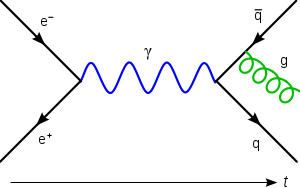| This article relies largely or entirely on a single source. Relevant discussion may be found on the talk page. Please help improve this article by introducing citations to additional sources. Find sources: "Radiative process" – news · newspapers · books · scholar · JSTOR (November 2024) |

In particle physics, a radiative process refers to one elementary particle emitting another and continuing to exist. This typically happens when a fermion emits a boson such as a gluon or photon.
Further information: Cooperative luminescence and cooperative absorptionSee also
References
- Rouan, Daniel (2011), Gargaud, Muriel; Amils, Ricardo; Quintanilla, José Cernicharo; Cleaves, Henderson James (Jim) (eds.), "Radiative Processes", Encyclopedia of Astrobiology, Berlin, Heidelberg: Springer, pp. 1407–1410, doi:10.1007/978-3-642-11274-4, ISBN 978-3-642-11274-4, retrieved 2024-11-05
This particle physics–related article is a stub. You can help Misplaced Pages by expanding it. |